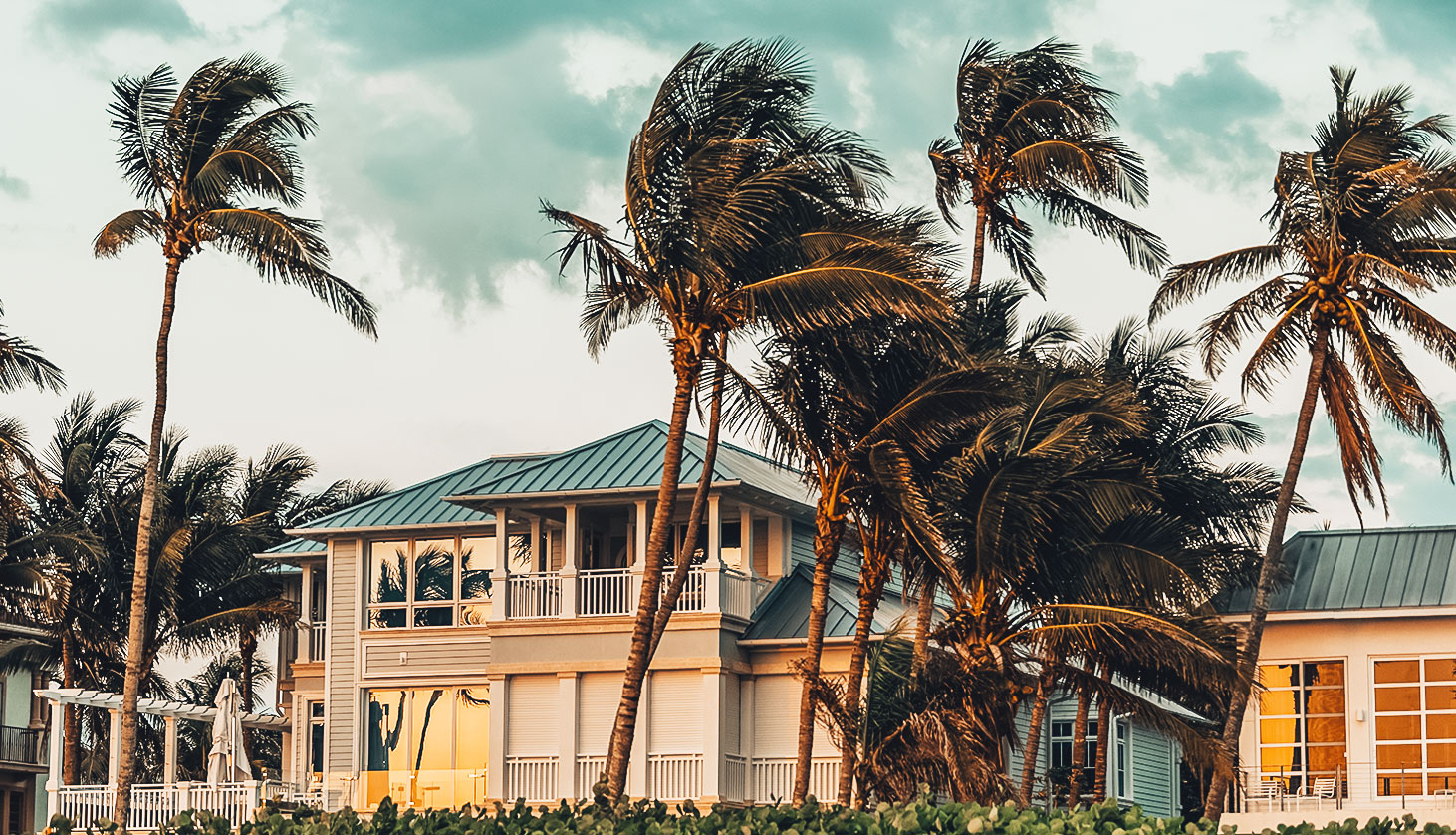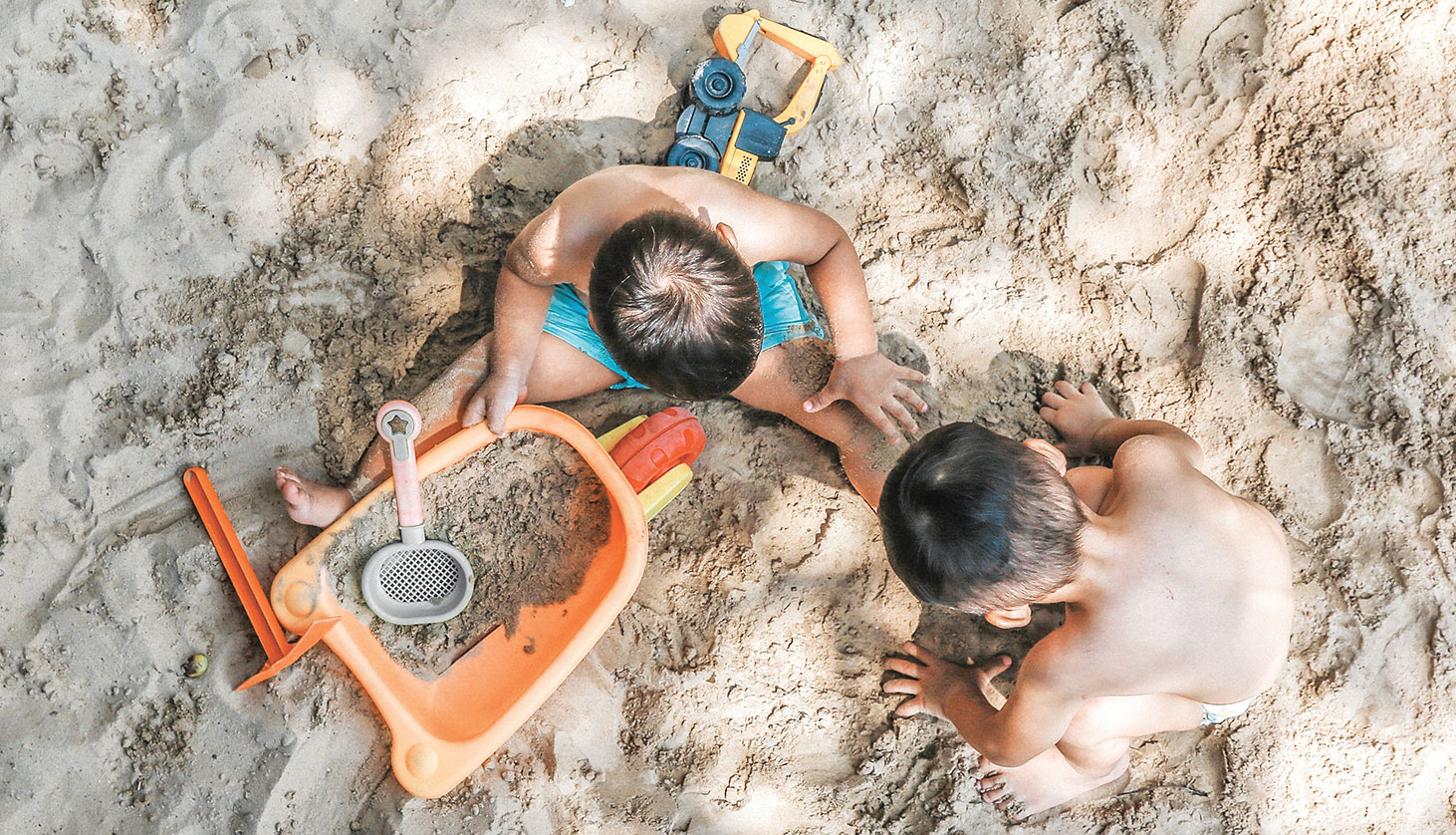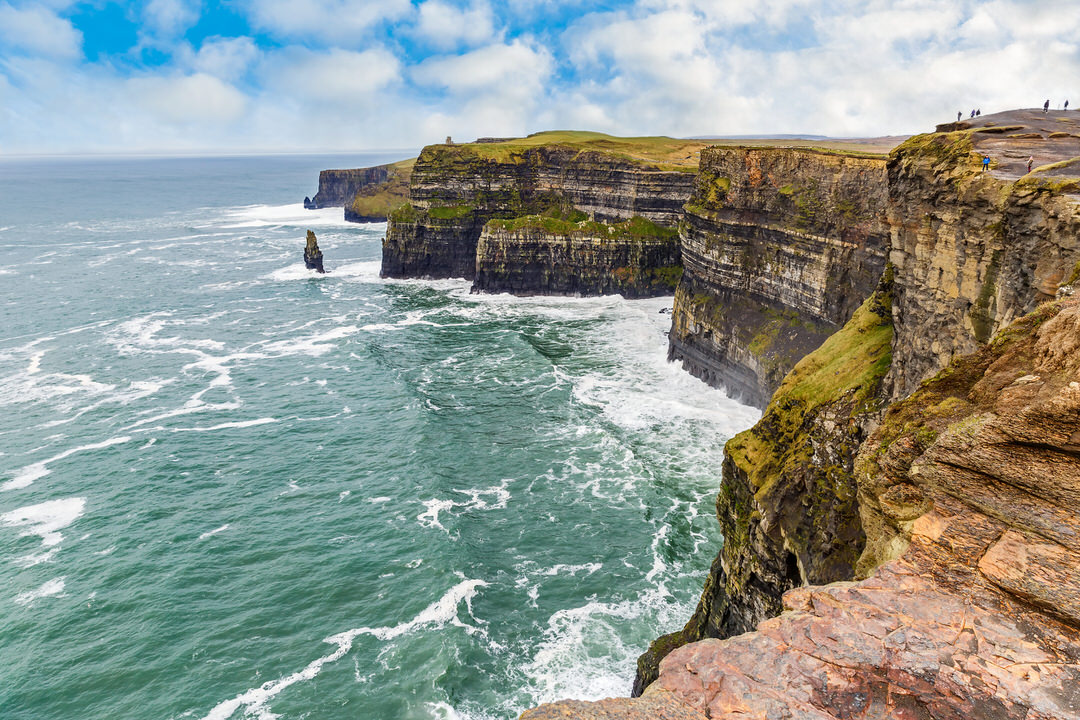Although it may seem counterintuitive to travel to hurricane-prone regions during its off-season, there are plenty of benefits that go along with this “riskier” travel.
Firstly, you likely won’t encounter a hurricane and will have a fair warning if you do. Secondly, you can expect heavily discounted rates on hotels, flights, and tours.
Finally, you’ll be free to enjoy your beach destination without the heavy crowds that are apparent during the rest of the year. At the end of the day, it’s more likely you’ll experience some heavy rain than scrambling to answer how to stay safe during a hurricane on your vacation.
Table of Contents:
- Traveling During Hurricane Season
- Hurricane Danger Levels
- What to Do Before a Hurricane
- What to Do During a Hurricane
- What to Do After a Hurricane
- Additional Resources
Traveling During Hurricane Season
Hurricane season varies depending on the region. Although some months are more typical for mighty Mother Nature to conjure a storm, they can occur at any moment outside of this time frame. Typically, hurricanes will hit along the eastern Pacific, Atlantic, and central Pacific regions.
- Atlantic Hurricane Season: June 1-November 30.
- Eastern Pacific Hurricane Season: May 15-November 30.
- Central Pacific Hurricane Season: June 1-November 30.
Luckily, we’re in an age where it’s unlikely to get caught off guard by a hurricane thanks to technological advancements. Typically, there’s at least a one-week lead time when meteorologists will be able to identify a hurricane in its early stages.
Still, these natural disasters can be catastrophic in their worst form, and it’s important to be prepared if you’re vacationing in a hurricane-prone area. Take extra precautions when preparing for your windy holiday season with the following tips:
- Pack Properly: Although you’ll likely know whether or not to expect a hurricane while you’re away, prepare your suitcase with extra supplies in mind. To name a few, make sure your duffle is stocked with a battery-powered flashlight, plenty of medications, a first-aid kit, antibacterial wipes, a backup battery source, and extra copies of insurance and identifying documentation.
- Stay Informed: Check in with family and friends if there is a hurricane watch or warning in the area. Continue to monitor updates from public safety officials, media, and the NOAA Weather Radio.
- Carry Documents: In the event of an unexpected storm, you’ll want to have information to identify yourself. Consider packing extra documentation like copies of your ID, passport, and insurance and carrying them on you at all times.
- Know Hurricane Guarantees and Travel Insurance Policies: Depending on your provider or insurance, there are different hurricane policies in place. Check your airline, hotel, and tour operators for hurricane-specific policies when it comes to refunds and rescheduling.
- Understand Evacuation Protocol: Tourists may be required to evacuate prior to residents in the event of a hurricane. Follow the first evacuation mandate as soon as it’s announced to the public.
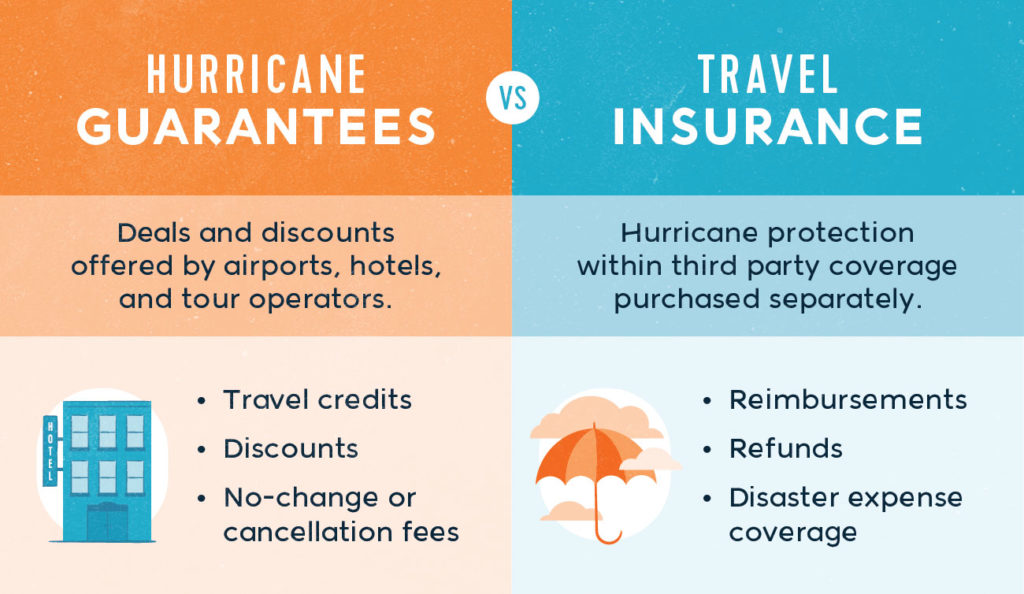
Hurricane Guarantees
A hurricane guarantee is essentially a policy put in place by tour operators, hotels, and airlines to increase business during this off-season. They can include discounts, packages, and even full refunds during severe weather where either you as a traveler or the provider cancels. Check with your operator to see if these guarantees are offered.
Travel Insurance and Hurricanes
A worthy alternative to hurricane guarantees is travel insurance. This type of coverage extends beyond hurricanes and can become useful in the event of a less life-threatening delay or cancellation. The key is to purchase this protection before the storm has been predicted for the most savings.
Know the Hurricane Danger Levels
Meteorologists can predict hurricanes in one of two ways. Seasonal probability and an existing hurricane’s track. If experts predict a storm is forecasted to contain winds of 74 mph or greater, they will issue a hurricane watch. This warning signifies the potential threat would hit within 48 hours, however, it does not guarantee the conditions.
A hurricane warning is issued when a hurricane threat with 74 mph winds or greater is expected within 36 hours. Hurricane warnings may be issued, or remain in effect, even if the winds are less than hurricane force if there are other potential disasters posed. These may include dangerously high waves, storm surges, and coastal or river flooding.
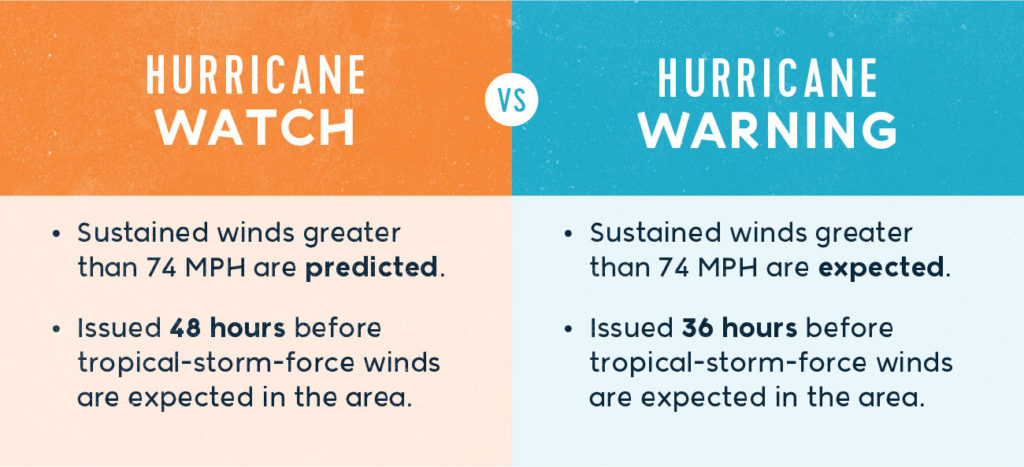
Saffir-Simpson Hurricane Wind Scale
The Saffir-Simpson Hurricane Wind Scale was developed by wind engineer Herb Saffir and meteorologist Bob Simpson. The duo used this scale to classify the wind strength and potential damage a hurricane is forecasted to have. It’s grouped into the following five categories:
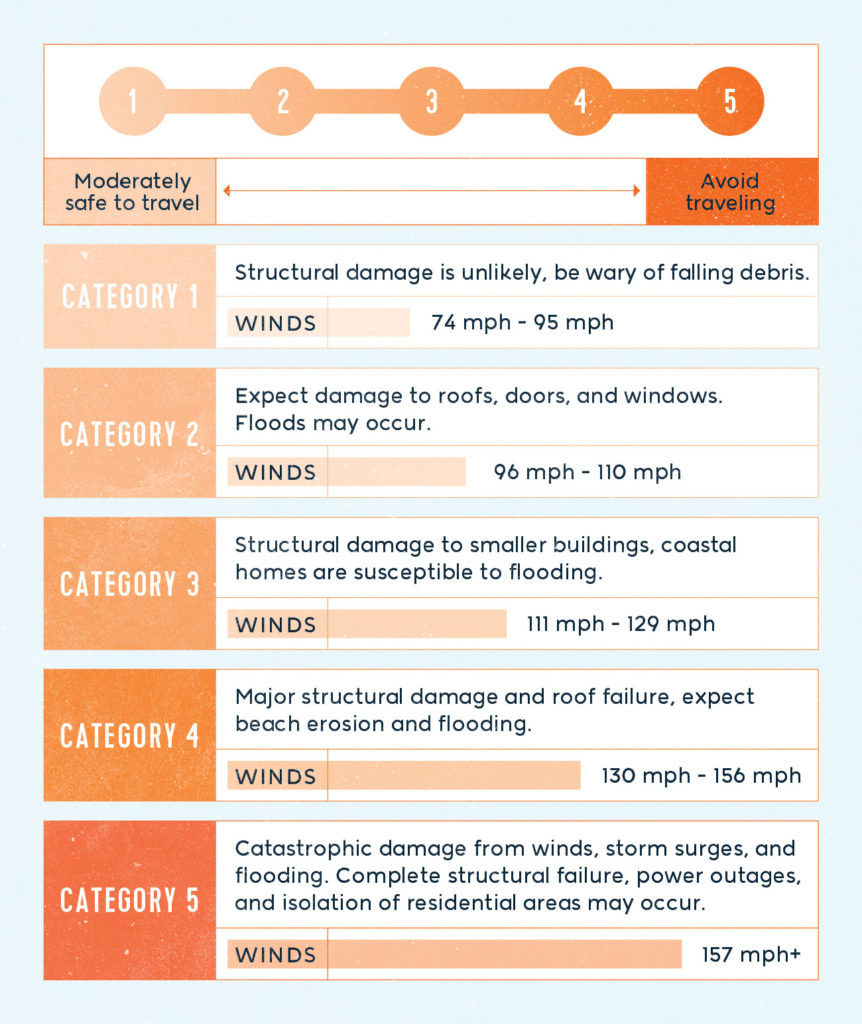
- Category 1 (Winds 74 mph – 95 mph): Structural damage is not likely, be wary of falling debris.
- Category 2 (Winds 96 mph – 110 mph): Expect damage to roofs, doors, and windows. Floods may occur.
- Category 3 (Winds 111 mph – 129 mph): Structural damage to smaller buildings, coastal homes are susceptible to flooding.
- Category 4 (Winds 130 mph – 156 mph): Major structural damage and roof failure, expect beach erosion and flooding.
- Category 5 (Winds 157 mph+): Catastrophic damage from winds, storm surges, and flooding. Complete structural failure, power outages, and isolation of residential areas may occur.
What to do Before a Hurricane Hits
If things are looking a little stormier than expected, it may be time to prepare for a hurricane to hit. If public safety officials call for a hurricane watch or warning, secure your accommodation, collect your belongings, and evacuate if necessary.
Secure Your Accommodation
Get out of town or bunker down? It may be a little nerve-wracking not being at home while a hurricane is on the horizon. The safest thing to do is follow advice from authorities to evacuate or shelter in place. If the latter, talk to your accommodation about hurricane safety measures they have in place like backup generators and their existing food and water supply.
- Find out how high the property sits, and listen closely to flood warnings.
- Pack your bags in case you need to leave your room.
- Draw the curtains and blinds on all the windows, and bring in outdoor furniture.
- Take shelter in a small closet or bathroom.
- Stay as far away from glass and doors as possible.
Collect Belongings
While you should be packed up and ready to leave in case of an evacuation notice, if you have time to gather extra supplies after a hurricane watch is called, it may be worth collecting additional materials. Make sure your disaster supply kit is stocked, back up any computer data you may need should it get destroyed, and make a few copies of important documents.
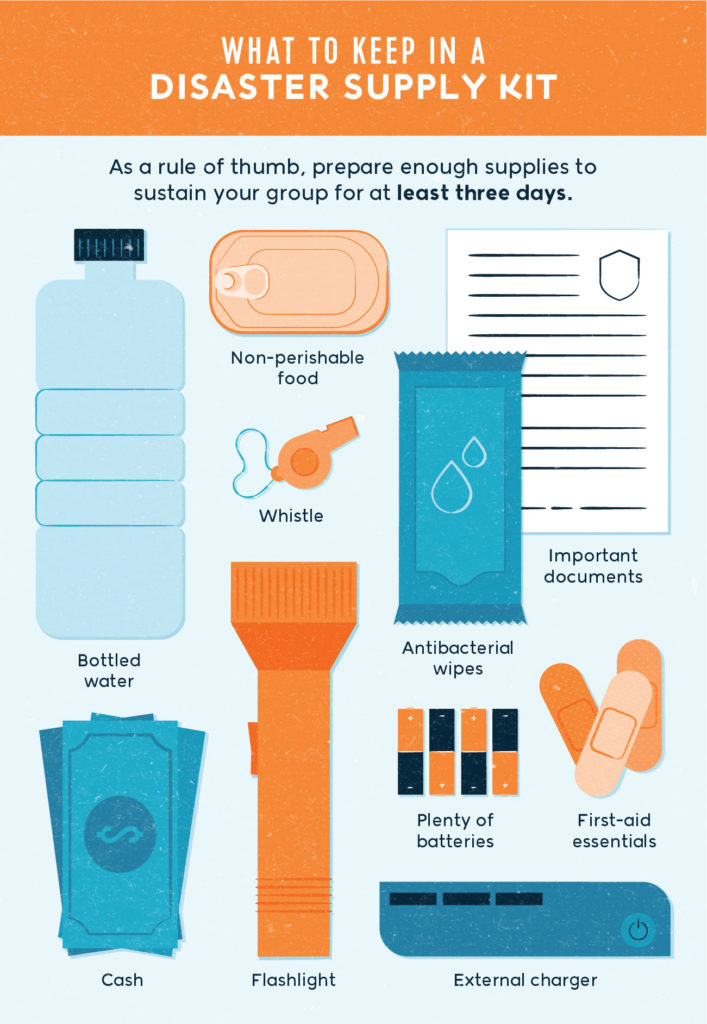
In an emergency, personally identifiable information is important to have. You’ll want to have additional copies of IDs, passports, and medical information on hand. Additionally, make sure you have copies of any insurance purchased and bank records.
Evacuate if Necessary
In the event of a hurricane, evacuation may be necessary. Always listen to local authorities for location, exit plans, and further directions. It’s wise to create a personal emergency plan taking the following into consideration.
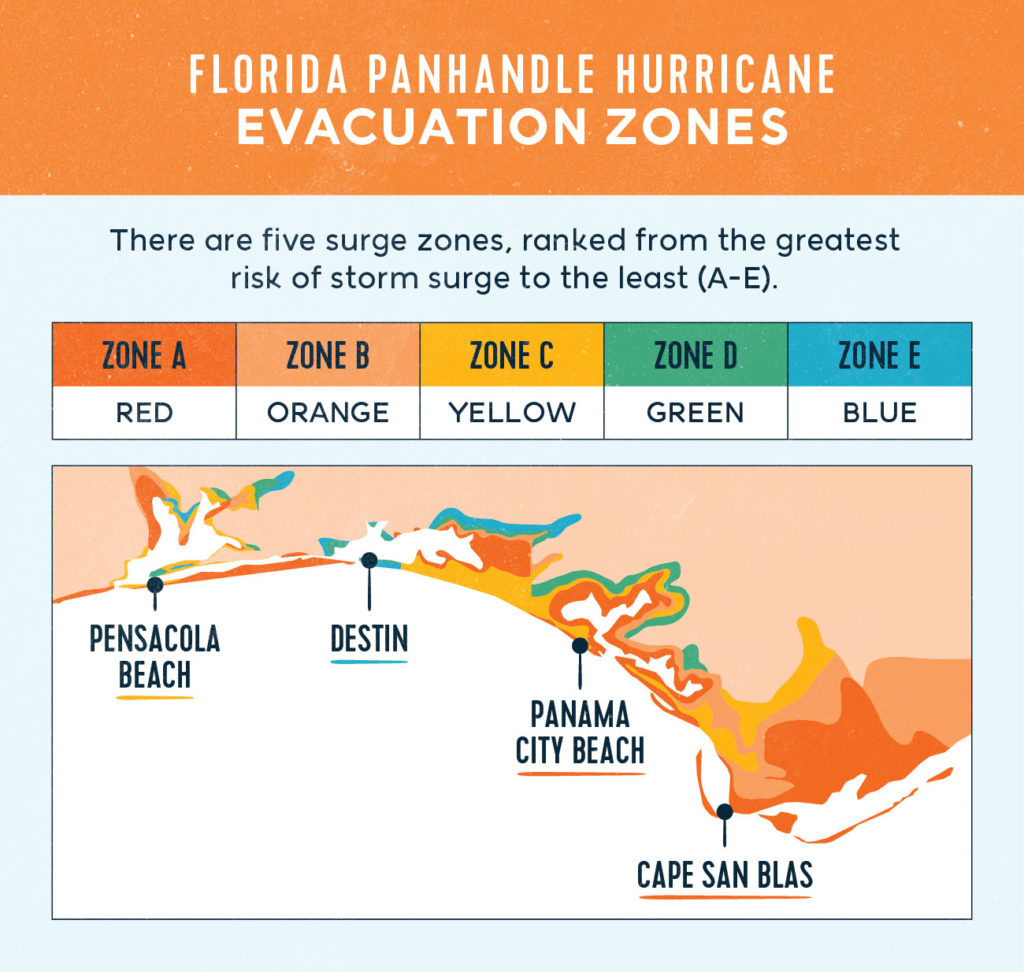
*Disclosure: This is not an exhaustive map, check your county website for changes and specific zones.
- Hurricane Zone: Understand what hurricane zone you’re in so you can listen to the appropriate evacuation protocol.
- Medical Service: Talk to your doctor or medical provider about alternative medical services in case of evacuation.
- Meeting Places: Connect with your family about meeting locations should you get separated.
- Contact Plan: Decide how you will get in touch with family and friends in case of power outages or out-of-service power lines.
What to do During a Hurricane
As the storm hits, stress levels may be high. Atmospheric pressure will drop, which may cause joint pain or trouble breathing. Stay calm, and follow hurricane precautions until it’s deemed safe and the “all clear” alert is given.
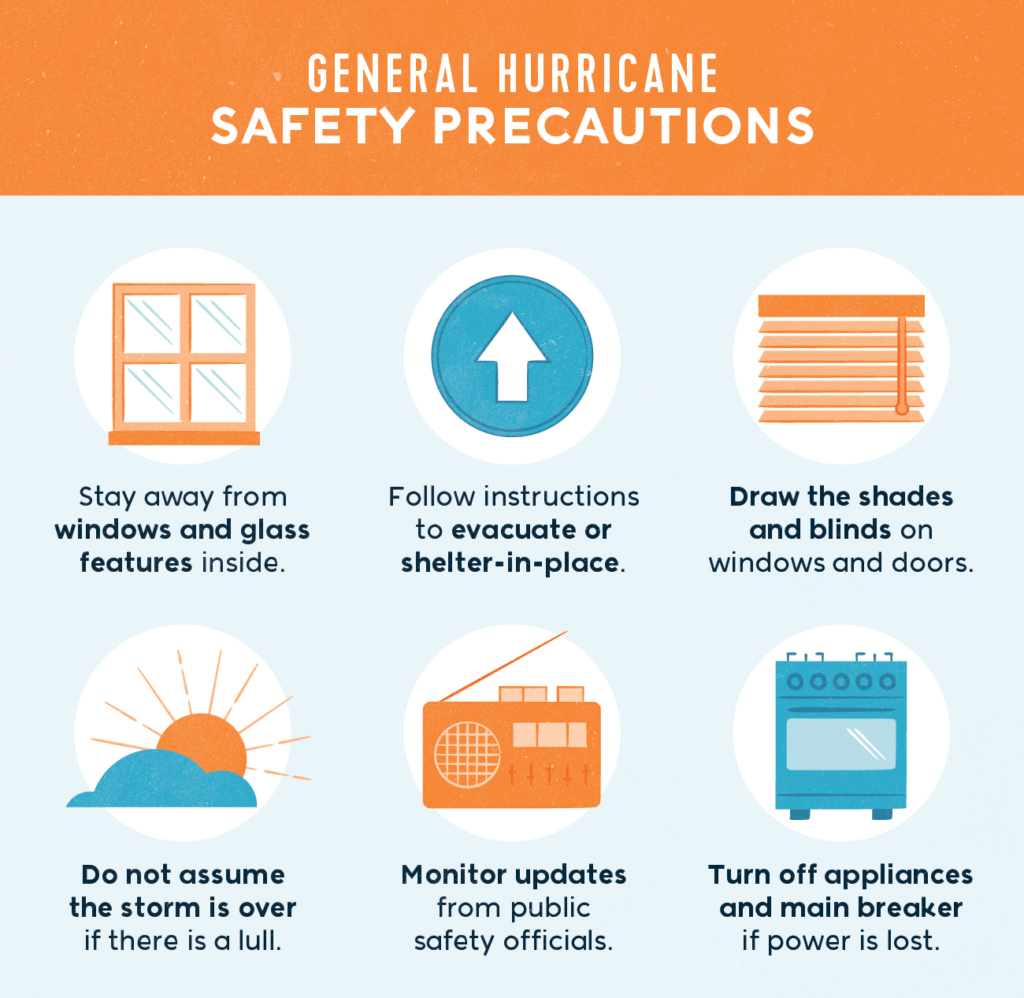
Keep Informed
Information can quickly change in the face of Mother Nature. Listen to hurricane watches and warnings carefully. Even if there is a lull in the storm, do not assume it’s over. Stay alert to authorities and public safety officials for further action. If you are called to evacuate, do so immediately, taking only the essentials.
Stay Inside
If a shelter-in-place ordinance is called, or you have missed the evacuation window, the safest place to remain is inside. Avoid driving or walking through flooded and partially flooded areas. Stay away from any windows, skylights, or glass doors inside the building. If there are appliances in your accommodation, turn off the power and stay away from any electrical equipment present.
Occupy Your Time
Staying busy during a storm is a stress reducer. Typically, hurricanes can last anywhere from 12 to 24 hours. Whether you have power or not while waiting out the storm, occupy yourself with these activities while Mother Nature does her thing.
- Catch up on sleep.
- Play cards.
- Practice journaling.
- Read a book.
- Have a wine night.
- Play board games.
- Practice doodling.
What to do After a Hurricane
So you’ve encountered a hurricane. Luckily, the most unpredictable part is over. Keep your morale high, find a community, and continue to take safety precautions.
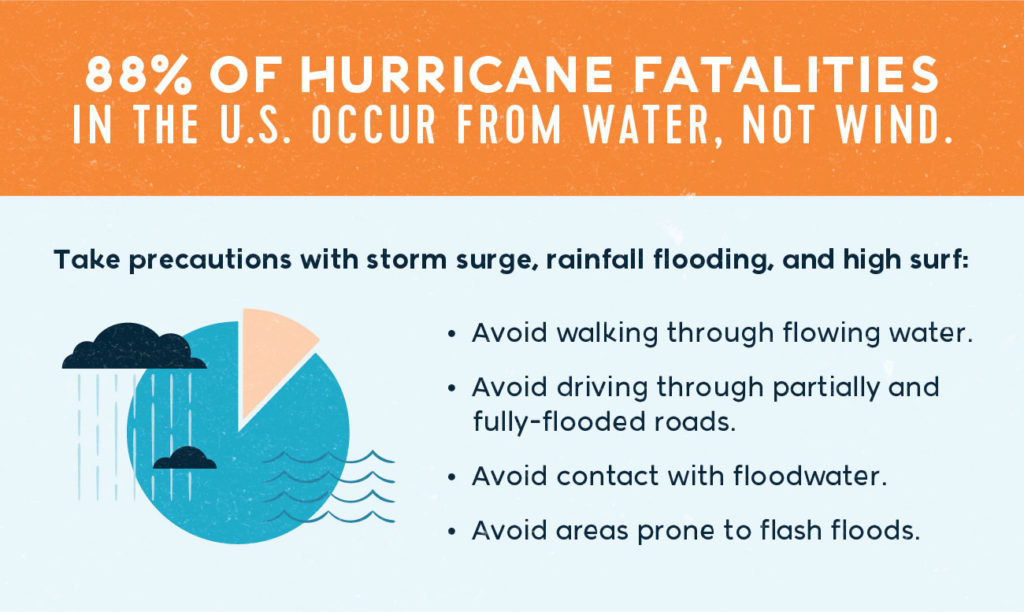
After a hurricane, it’s important to wait for the “all clear” from officials. The dangers of extended rainfall and flooding do not end with the storm, and it’s important to stay vigilant about these possibilities. If possible, inform your family and friends about your safety. Remain indoors, and avoid driving—cars can be swept away in two feet of moving water.
Finally, avoid floodwaters. Puddles, streams, and lakes could be contaminated by oil or raw sewage. Always assume that wires are live, and do not touch them—even if it’s an obstacle. Without putting yourself in danger, check for anyone injured. Lastly, report hazards such as downed power lines, gas leaks, and power outages to authorities.
Additional Resources
There are plenty of government and charity organizations available to provide continued hurricane preparedness and education. Consider reading the following resources before embarking on vacation during hurricane season.
- National Hurricane Center
- FEMA Flood Map Service Center
- American Red Cross Hurricane Safety
- FEMA: Evacuation and Shelter-in-Place
Although hurricane season can affect travel bookings, don’t let that deter you from safely traveling through the region during these months. The risk of storms like hurricanes or tornadoes can be nerve-wracking, but with proper preparation, even the possibility of danger can’t beat out a beautiful (and cost-effective) vacation to Pensacola Beach or another stunning stop along the Atlantic Ocean.
Sources: NHC NOAA | National Weather Service | MIT | The Weather Channel

